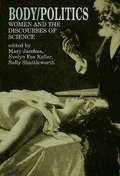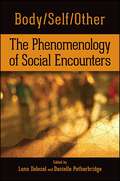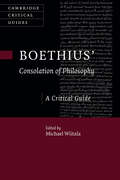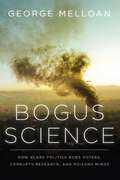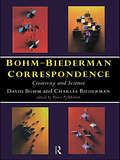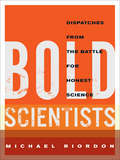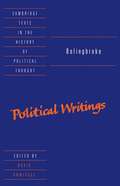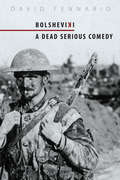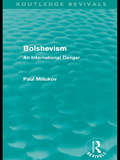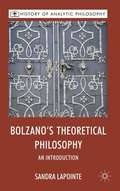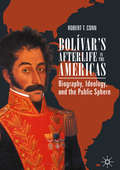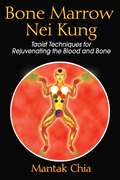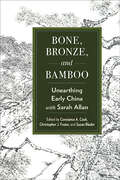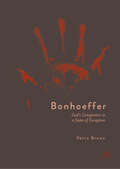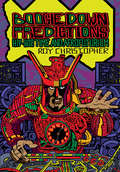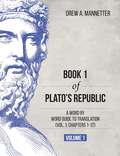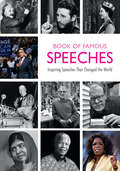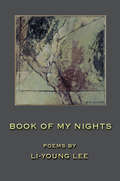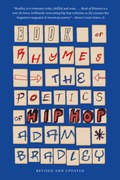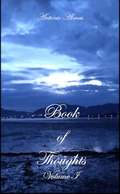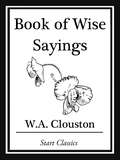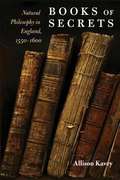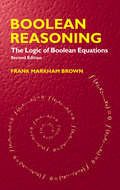- Table View
- List View
Body/Politics: Women and the Discourses of Science
by Sally Shuttleworth Mary Jacobus Evelyn Fox KellerBody/Politics demonstrates how many of the controversies in modern science involve or invoke the feminine body as their battleground. This groundbreaking collection addresses such scientific issues as artificial fertilization, the "crisis" in childbirth management,and the medical invention of "female" maladies and the debates surrounding them. In the process it makes an important attempt to remedy the traditional division between science and non-science by focusing on the interconnection of literary, social, and scientific discourses concerning the female body. The editors have brought together noted feminist scholars and critics from various fields. Contributers include Susan Bordo, Mary Ann Doane, Donna Haraway, Emily Martin, Mary Poovey and Paula A. Treichler.
Body/Self/Other: The Phenomenology of Social Encounters
by Luna Dolezal; Danielle PetherbridgeBody/Self/Other brings together a variety of phenomenological perspectives to examine the complexity of social encounters across a range of social, political, and ethical issues. It investigates the materiality of social encounters and the habitual attitudes that structure lived experience. In particular, the contributors examine how constructions of race, gender, sexuality, criminality, and medicalized forms of subjectivity affect perception and social interaction. Grounded in practical, everyday experiences, this book provides a theoretical framework that considers the extent to which fundamental ethical obligations arise from the fact of individuals' intercorporeality and sociality.
Boethius’ ‘Consolation of Philosophy’: A Critical Guide (Cambridge Critical Guides)
by Michael WiitalaBoethius' Consolation of Philosophy was one of the most widely read and influential texts in medieval Europe, considering questions such as How can evil exist in a world governed by God? And how is happiness still attainable despite the vicissitudes of fortune? Written as a dialogue between Boethius and Lady Philosophy, and alternating between poetry and prose, the Consolation is of interest not only to philosophers but to students of classics and literature as well. In this Critical Guide, the first collection of philosophical essays devoted exclusively to the Consolation, thirteen new essays demonstrate its ongoing vitality and break open its riches for a new generation of readers. The essays reflect the diverse array of approaches in contemporary scholarship and attend to both the literary features and the philosophical content of the Consolation. The volume will be invaluable for scholars of medieval philosophy, medieval literature, and the history of ideas.
Bogus Science: How Scare Politics Robs Voters, Corrupts Research and Poisons Minds
by George MelloanThe good name of true science has been hijacked for several decades by politicians in support of dubious political goals.The good name of true science, which has transformed the world we live in marvelous ways over the last 200 years, has been hijacked for several decades by politicians seeking to employ science and scientists in support of dubious political goals. They have used their power over grants to universities and their power over federal regulatory agencies and United Nations initiatives to this end. Bogus Science examines a series of scares perpetrated by American politicians in collaboration with the UN over the last fifty years: DDT, acid rain, the "ozone hole" and of course "global warming." These scares have cost the world trillions of dollars and all have been debunked by serious scientists. Author George Melloan argues that protection of the environment is a goal that all rational people share, and the incredible advance of genuine science has brought about great strides in creating a cleaner, healthier, and safer human environment in the course of modern history. But that noble cause has been hijacked by zealots motivated by other impulses, which in the extreme derive from what some social philosophers describe as anti-humanism. "Environmentalist" claims, even when deceptive, are particularly seductive to young people seeking meaning in their lives. And sure enough, zealots have brought their influence to bear on millions of schoolchildren who have been told that their lives will be cut short if they disregard the warnings of modern Pied Pipers. While discussing the power politicians have over science, Melloan looks into the growing scandal in science about a lack of reproducibility of experiments or studies purporting to be "scientific." Real scientists know that if an experiment or a computer model is to be deemed valid, the same methodology employed by other scientists must achieve the same result. The absence of this, often in studies printed in professional journals, is shocking to many scientists. One example of flawed experiments is the great novel coronavirus panic of 2020. It was fanned by dubious data gleaned from a computer model devised by a team at the Imperial College London. It predicted 500,000 deaths in the U.K. and 2 million in the U.S. Looking at that frightening prospect, politicians ordered "lockdowns" that idled much of the global economy and threw millions of people out of work and into social isolation. They have done enormous economic and psychological damage over three months. But now we are finding that the coronavirus was nowhere near as dangerous as forecast by the computer model. And so far, the London team, like the global warming modelers and other scientists, have not revealed its methodology.
Bohm-Biederman Correspondence: Creativity in Art and Science
by David Bohm Charles Biederman"It was sheer chance that I encountered David Bohm's writing in 1958 ... I knew nothing about him. What struck me about his work and prompted my initial letter was his underlying effort to seek for some larger sense of reality, which seemed a very humanized search." - Charles Biederman, from the foreword of the bookThis book marks the beginning of a four thousand page correspondence between Charles Biederman, founder of Constructivism in the 1930s, and David Bohm the prestigious physicist known for his interpretation of quantum theory. Available for the first time, we are given a rare opportunity to read through and engage in a remarkable transatlantic, intellectual discussion on art and science, creativity and theory.
Bold Scientists: Dispatches from the Battle for Honest Science
by Michael RiordonAs governments and corporations scramble to pull the plug on research that proves that they are poisoning our planet and rush to muzzle the scientists who dare to share their disturbing data, it seems the powerful have declared a war on science. Michael Riordon asks deep questions of bold scientists who defy the status quo including: an Indigenous biologist who integrates traditional knowledge and a trickster’s wit; an engineering professor who exposes the myths and dangers of fracking; a forensic geneticist who traces children stolen by the military in El Salvador; a sociologist who investigates the lure and threat of mass surveillance; a radical psychologist who confronts psychiatry’s dangerous power; and a young marine biologist who risks her career to defend science and democracy. Who controls science and at what cost to the earth and its inhabitants? Can we change? This is unspun science for dangerous times.
Bolingbroke: Political Writings
by David Armitage Henry St. John BolingbrokeHenry St John, Viscount Bolingbroke, was one of the most creative political thinkers in eighteenth-century Britain. In this volume, modernised and fully annotated texts of his most important political works, the Dissertation upon Parties, the letter, 'On the Spirit of Patriotism', and The Idea of the Patriot King, are brought together for the first time. Bolingbroke was the first major thinker to face the long-term economic and political consequences of the Glorious Revolution, particularly the creation of the first modern system of party politics. In these works he attempted to forge an ideology of opposition to attack the Whig oligarchy of Sir Robert Walpole. His analyses of constitutional government and the party system are still relevant to the dilemmas of modern democratic politics, as are his recommendations for a patriotic commitment to the common good and the necessity of a non-partisan executive.
Bolsheviki
by David FennarioSet in a hotel bar in Montreal on Remembrance Day, Bolsheviki has World War I veteran Harry "Rosie" Rollins telling young reporter Jerry Nines about his experience in the trenches. Rollins recalls men pissing their pants, losing limbs, and planning a revolt against their officers. The character of Rosie Rollins is based on World War I veteran Harry "Rosie" Rowbottom, who was wounded at Vimy Ridge. Fennario taped an interview with Rowbottom in 1979 in the old "King Eddy" Hotel in Toronto over a bottle of Bushmills whiskey.Rosie's meandering monologue delivers a blistering de-glorification of war as it shifts back and forth between his wartime recollections and the present. The veteran's clattering, fast-paced description of life-and death-on the Western Front reproduces the chaotic sounds and rhythm of battle. This cutting-edge drama, profoundly in opposition to conventional histories of Canadian troops in World War I, debunks every sentimental notion of duty, heroism, and nationhood. "Birth of Nation" they called it on TV but I didn't see nobody getting born just a lot of people dying so we could sit there on top of another shit hole of mud with Captain Rutherford still pushing for that DSO or the MC or the MCB or the YMCA with Triangles-just give him a medal will ya?Cast of 1 man.
Bolshevism: An International Danger (Routledge Revivals)
by Paul MiliukovFirst published in 1920, Paul Miliukov’s book concerns the international nature of Bolshevism, both in terms of its ideologically internationalist doctrine of World Revolution and in terms of the attempts to spread Bolshevism in the period immediately preceding and following the First World War and the Russian revolution of October 1917. This reissue is a must for anyone interested in the rise of Bolshevism as an international force.
Bolzano's Theoretical Philosophy
by Sandra LapointeThe first book in English to offer a systematic survey of Bolzano's philosophical logic and theory of knowledge, it offers a reconstruction of Bolzano's views on a series of key issues: the analysis of meaning, generality, analyticity, logical consequence, mathematical demonstration and knowledge by virtue of meaning.
Bolívar’s Afterlife in the Americas: Biography, Ideology, and the Public Sphere
by Robert T. ConnSimón Bolívar is the preeminent symbol of Latin America and the subject of seemingly endless posthumous attention. Interpreted and reinterpreted in biographies, histories, political writings, speeches, and works of art and fiction, he has been a vehicle for public discourse for the past two centuries. Robert T. Conn follows the afterlives of Bolívar across the Americas, tracing his presence in a range of competing but interlocking national stories. How have historians, writers, statesmen, filmmakers, and institutions reworked his life and writings to make cultural and political claims? How has his legacy been interpreted in the countries whose territories he liberated, as well as in those where his importance is symbolic, such as the United States? In answering these questions, Conn illuminates the history of nation building and hemispheric globalism in the Americas.
Bonaparte
by Patrice GueniffeyPatrice Gueniffey, the leading French historian of the Revolutionary and Napoleonic age, takes up the epic narrative at the heart of this turbulent period: the life of Napoleon himself, from his boyhood in Corsica, to his meteoric rise during the Italian and Egyptian campaigns, to his proclamation as Consul for Life in 1802.
Bone Marrow Nei Kung: Taoist Techniques for Rejuvenating the Blood and Bone
by Mantak ChiaA guide to nourishing the body through bone marrow rejuvenation exercises • Presents exercises to “regrow” bone marrow, revive the internal organs, and prevent osteoporosis • Explains the use of bone breathing and bone compression, “hitting” to detoxify the body, and sexual energy massage and chi weight lifting to enhance the life force within Most Westerners believe that a daily physical exercise program helps slow the aging process. Yet those whose bodies appear most physically fit on the outside often enjoy only the same life span as the average nonathletic person. It is the internal organs and glands that nourish every function of the body, and it is the bone marrow that nourishes and rejuvenates the organs and glands through the production of blood. By focusing only on the muscles without cultivating the internal organs, bones, and blood, the Western fitness regimen can ultimately exhaust the internal system. In Bone Marrow Nei Kung Master Mantak Chia reveals the ancient mental and physical Taoist techniques used to “regrow” bone marrow, strengthen the bones, and rejuvenate the organs and glands. An advanced practice of Iron Shirt Chi Kung, Bone Marrow Nei Kung was developed as a way to attain the “steel body” coveted in the fields of Chinese medicine and martial arts. This method of absorbing energy into the bones revives the bone marrow and reverses the effects of aging through the techniques of bone breathing, bone compression, and sexual energy massage, which stimulates the hormonal production that helps prevent osteoporosis. Also included is extensive information on chi weight lifting and the practice of “hitting” to detoxify the body.
Bone, Bronze, and Bamboo: Unearthing Early China with Sarah Allan (SUNY series in Chinese Philosophy and Culture)
by Constance A. Cook; Christopher J. Foster; Susan BladerBone, Bronze, and Bamboo explores the tremendous wealth of newly unearthed artifacts and manuscripts that have been revolutionizing the study of early China. Leading scholars from China and abroad lend their expertise in archaeology, art history, paleography, intellectual history, and many other disciplines to show how these fascinating finds change our understanding of China's past. Organized in a chronological progression from the Shang to Han periods, and treating bone, bronze, and bamboo-strip artifacts in turn, the book treats a wide breadth of topics, from the status of owls in Shang religion to the Zhou court's economic interest in managing salt resources, and from the conceptual evolution of de 德 in Spring and Autumn covenants to the interplay between materiality and text in Han scribal primers. Bone, Bronze, and Bamboo exemplifies the exciting energy and sense of discovery inspired by these sources in recent years, while surveying the latest debates and developments shaping early China as a field.
Bonhoeffer: God’s Conspirator in a State of Exception
by Petra BrownTheologian. Conspirator. Martyr. Saint. Dietrich Bonhoeffer was killed in the waning days of World War II, having been implicated in the July 20th assassination attempt on Hitler. Since his death, Bonhoeffer’s life and writings have inspired contradictory responses. He is often seen as a model for Christian pacifist resistance, and more recently for violent direct political action. Bonhoeffer’s name has been invoked by violent anti-abortion protestors as well as political leaders calling for support on a ‘war on terror’ in the aftermath of 9/11. Petra Brown critically analyses Bonhoeffer’s writing preceding and during his conspiracy involvement, particularly his recurring concept of the ‘extraordinary.’ Brown examines this idea in light of ‘the state of exception,’ a concept coined by the one-time Nazi jurist and political theorist, Carl Schmitt. She also draws on the existentialist philosopher Sören Kierkegaard to consider what happens when discipleship is understood as obedience to a divine command. This book aims to complicate an unreflective admiration of Bonhoeffer’s decision for conspiracy, and draws attention to the potentially dangerous implications of his emerging political theology.
Boogie Down Predictions: Hip-Hop, Time, and Afrofuturism
by Kodwo Eshun Steven Shaviro Rasheeda PhillipsEssays that explore the connections between time, representation, and identity within hip-hop culture."This book, edited by Roy Christopher, is a moment. It is the deconstructed sample, the researched lyrical metaphors, the aha moment on the way to hip-hop enlightenment. Hip-hop permeates our world, and yet it is continually misunderstood. Hip-hop's intersections with Afrofuturism and science fiction provide fascinating touchpoints that enable us to see our todays and tomorrows. This book can be, for the curious, a window into a hip-hop-infused Alter Destiny--a journey whose spaceship you embarked on some time ago. Are you engaging this work from the gaze of the future? Are you the data thief sailing into the past to U-turn to the now? Or are you the unborn child prepping to build the next universe? No, you're the superhero. Enjoy the journey."--from the introduction by Ytasha L. WomackThrough essays by some of hip-hop's most interesting thinkers, theorists, journalists, writers, emcees, and DJs, Boogie Down Predictions embarks on a quest to understand the connections between time, representation, and identity within hip-hop culture and what that means for the culture at large. Introduced by Ytasha L. Womack, author of Afrofuturism: The World of Black Sci-Fi and Fantasy Culture, this book explores these temporalities, possible pasts, and further futures from a diverse, multilayered, interdisciplinary perspective.
Book 1 of Plato's Republic: A Word by Word Guide to Translation (Vol. 1: Chapters 1-12)
by Drew A. MannetterVolume 1 of this new grammatical reader on the first 12 chapters of Book 1 of Plato’s Republic is the most thorough of available resources, designed for students who have only basic skills as well as those at a more advanced level. The text is complete and not adapted; no difficult passages are excised. The running vocabularies are complete, providing the reader context specific meanings. The text is broken down into sentences, providing a manageable amount of material, and space is provided for translation after each sentence. Every construction and word is discussed in detail and referenced to Smyth’s Greek Grammar for further explanation. The details of the text, accents, conjunctions, adverbs, and particles, are not minimized but receive thorough treatment as well. The presentation allows for beginning students to make thorough use of the notes while more advanced students are able to consult the notes only when necessary and thus build up speed in translation.°Special features include:°°1) Complete, unadapted text.°2) Full running vocabulary; no words are omitted.°3) Every word is discussed; none are omitted.°4) Every construction is discussed; none are omitted.°5) All particles are explained; none are omitted.°6) Every word and construction is cross referenced to Smyth’s Greek Grammar for further explanation.°7) Room is provided after each sentence for translation.°8) Accentuation, where challenging, is discussed.
Book of Famous Speeches: Inspiring Orations That Changed the World
by Carlo BatàThe Speeches That Defined Our EraWhat were the most important and influential speeches of our time? Discover the answers in this book of speeches that changed our world.Famous historical speeches. This remarkable collection of 38 historic speeches, spanning from post-World War II to the present, offers unparalleled insight into pivotal moments in our recent history. Experience the power of words that shaped nations and understand the visionary minds behind them, from Martin Luther King Jr.'s 'dream' to Malala's impassioned plea for education.Inspiration for the future and insight into the past. In Famous Speeches, gain a deeper understanding of our evolving world through the voices that changed it forever. Travel back to these monumental moments and experience firsthand the transformative power of oration.Inside:Understand the sentiments and visionary ideas of post-World War II leaders and influencersExperience the emotional impact of words that changed the course of historyExplore speeches by statesmen, scientists, literary figures, entrepreneurs, and advocates for educationDiscover inspiration for the future and deepen your knowledge of some of history's greatest speakersIf you liked The Founders' Speech to a Nation in Crisis; Great Speeches by Frederick Douglass; or The Origin of Names, Words and Everything in Between, you’ll love Famous Speeches.
Book of My Nights
by Li-Young LeeBook of My Nights is the first poetry collection in ten years by one of the world's most acclaimed young poets. In Book of My Nights, Li-Young Lee once again gives us lyrical poetry that fuses memory, family, culture and history. In language as simple and powerful as the human muscle, these poems work individually and as a full-sequence meditation on the vulnerability of humanity.Marketing Plans: o National advertising o National media campaign o National and regional author appearances o Advance reader copies o Course adoption mailingLi-Young Lee burst onto the American literary scene with the publication of Rose, winner of the 1986 Delmore Schwartz Memorial Poetry Award from The Poetry Society of America. He followed that astonishing book with The City in Which I Love You, which was The Lamont Poetry Selection of The Academy of American Poets. Mr. Lee has appeared on National Public Radio a number of times and The Power of the Word, the PBS television series with Bill Moyers. Rose and The City in Which I Love You are in the 19th and 17th printings respectively, making them two of the highest-selling contemporary poetry books in the United States. Moreover, Mr. Lee's poems have been translated into more than a dozen languages. He currently lives in Chicago.
Book of My Nights (American Poets Continuum)
by Li-Young LeeBook of My Nights is the first poetry collection in ten years by one of the world's most acclaimed young poets. In Book of My Nights, Li-Young Lee once again gives us lyrical poetry that fuses memory, family, culture and history. In language as simple and powerful as the human muscle, these poems work individually and as a full-sequence meditation on the vulnerability of humanity.Marketing Plans: o National advertising o National media campaign o National and regional author appearances o Advance reader copies o Course adoption mailingLi-Young Lee burst onto the American literary scene with the publication of Rose, winner of the 1986 Delmore Schwartz Memorial Poetry Award from The Poetry Society of America. He followed that astonishing book with The City in Which I Love You, which was The Lamont Poetry Selection of The Academy of American Poets. Mr. Lee has appeared on National Public Radio a number of times and The Power of the Word, the PBS television series with Bill Moyers. Rose and The City in Which I Love You are in the 19th and 17th printings respectively, making them two of the highest-selling contemporary poetry books in the United States. Moreover, Mr. Lee's poems have been translated into more than a dozen languages. He currently lives in Chicago.
Book of Rhymes: The Poetics of Hip Hop
by Adam BradleyIf asked to list the greatest innovators of modern American poetry, few of us would think to include Jay-Z or Eminem in their number. And yet hip hop is the source of some of the most exciting developments in verse today. The media uproar in response to its controversial lyrical content has obscured hip hop's revolution of poetic craft and experience: Only in rap music can the beat of a song render poetic meter audible, allowing an MC's wordplay to move a club-full of eager listeners.Examining rap history's most memorable lyricists and their inimitable techniques, literary scholar Adam Bradley argues that we must understand rap as poetry or miss the vanguard of poetry today. Book of Rhymes explores America's least understood poets, unpacking their surprisingly complex craft, and according rap poetry the respect it deserves.
Book of Thoughts
by Antonio AlmasA book with small thoughts about life, spirituality and society. The end of the path is the place where we despoil ourselves of our bodies and receive the wings that finally will make us fly towards infinity. In the sea of dreams sail caravels of angels that blow their charms on the sails. Feel the breeze that strokes your hair.
Book of Wise Sayings
by W. A. CloustonWhen a man has reached middle-age he generally feels with tenfold force the truth of those "sayings of the wise" which he learned in his early years, and has cause to regret, as well as wonder, that he had not all along followed their wholesome teaching. For it is to the young, who are about to cross the threshold of active life, that such terse convincing sentences are more especially addressed, and, spite of the proverbial heedlessness of youth, there will be found many who are not deaf to this kind of instruction, if their moral environment be favourable. But, even after the spring-time of youth is past, there are occasions when the mind is peculiarly susceptible to the force of a pithy maxim, which may tend to the reforming of one's way of life. There is commonly more practical wisdom in a striking aphorism than in a round dozen of "goody" books--that is to say, books which are not good in the highest sense, because their themes are overlaid with commonplace and wearisome reflections.
Books of Secrets: Natural Philosophy in England, 1550-1600
by Allison KaveyHow cultural categories shaped--and were shaped by--new ideas about controlling nature Ranging from alchemy to necromancy, "books of secrets" offered medieval readers an affordable and accessible collection of knowledge about the natural world. Allison Kavey's study traces the cultural relevance of these books and also charts their influence on the people who read them. Citing the importance of printers in choosing the books' contents, she points out how these books legitimized manipulating nature, thereby expanding cultural categories, such as masculinity, femininity, gentleman, lady, and midwife, to include the willful command of the natural world.
Boolean Reasoning: The Logic of Boolean Equations
by Frank Markham BrownA systematic treatment of Boolean reasoning, this concise, newly revised edition combines the works of early logicians with recent investigations, including previously unpublished research results.For the benefit of readers without formal training in mathematics, the text starts with an overview of elementary mathematical concepts and outlines the theory of Boolean algebras, based on Huntington's postulate. It defines operators for elimination, division, and expansion, providing a coherent and systematic basis for subsequent discussions of syllogistic reasoning, the solution of Boolean equations, and functional deduction.Examples and end-of-chapter problems appear throughout the book, many taken from the design for switching systems. Two concluding chapters deal with applications; one applies Boolean reasoning to diagnostic problems, and the other discusses the design of multiple-output logic-circuits.
